
Wetenschap
Swap-netwerken optimaliseren voor quantum computing
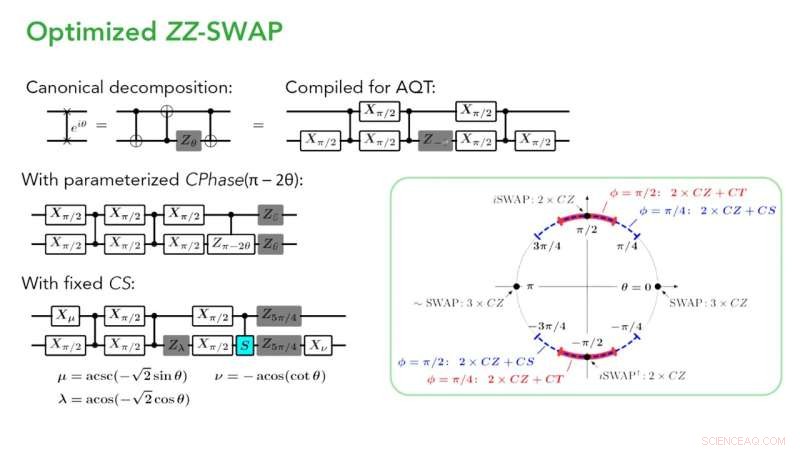
Uitgebreid schema van voor software geoptimaliseerde SWAP-netwerken voor de poorten van AQT. Krediet:Rich Rines/Super.tech
Een onderzoekspartnerschap bij het Advanced Quantum Testbed (AQT) van het Lawrence Berkeley National Laboratory (Berkeley Lab) en het in Chicago gevestigde Super.tech (overgenomen door ColdQuanta in mei 2022) toonde aan hoe de uitvoering van het ZZ SWAP-netwerkprotocol kan worden geoptimaliseerd, belangrijk voor kwantumcomputers. Het team introduceerde ook een nieuwe techniek voor het verminderen van kwantumfouten die de implementatie van het netwerkprotocol in kwantumprocessors zal verbeteren. De experimentele gegevens zijn in juli gepubliceerd in Physical Review Research , waardoor op korte termijn meer paden worden toegevoegd om kwantumalgoritmen te implementeren met behulp van op poorten gebaseerde kwantumcomputing.
Een slimme compiler voor supergeleidende kwantumhardware
Quantumprocessors met twee- of driedimensionale architecturen hebben een beperkte qubit-connectiviteit waarbij elke qubit met slechts een beperkt aantal andere qubits interageert. Bovendien kan de informatie van elke qubit slechts zo lang bestaan voordat ruis en fouten decoherentie veroorzaken, waardoor de looptijd en betrouwbaarheid van kwantumalgoritmen worden beperkt. Daarom moeten onderzoekers bij het ontwerpen en uitvoeren van een kwantumcircuit de vertaling optimaliseren van het circuit dat bestaat uit abstracte (logische) poorten naar fysieke instructies op basis van de native hardwarepoorten die beschikbaar zijn in een bepaalde kwantumprocessor. Efficiënte circuitdecomposities minimaliseren de bedrijfstijd omdat ze rekening houden met het aantal poorten en bewerkingen die van nature door de hardware worden ondersteund om de gewenste logische bewerkingen uit te voeren.
SWAP-poorten - die informatie tussen qubits uitwisselen - worden vaak geïntroduceerd in kwantumcircuits om interacties tussen informatie in niet-aangrenzende qubits te vergemakkelijken. Als een kwantumapparaat alleen poorten tussen aangrenzende qubits toestaat, worden swaps gebruikt om informatie van de ene qubit naar een andere niet-aangrenzende qubit te verplaatsen.
In lawaaierige tussenschaal kwantum (NISQ) hardware, kan het introduceren van swap-gates een grote experimentele overhead vergen. De swap-poort moet vaak worden ontleed in native poorten, zoals gecontroleerde-NIET-poorten. Daarom is het bij het ontwerpen van kwantumcircuits met beperkte qubit-connectiviteit belangrijk om een slimme compiler te gebruiken die redundante kwantumpoorten kan zoeken, ontleden en annuleren om de runtime van een kwantumalgoritme of -toepassing te verbeteren.
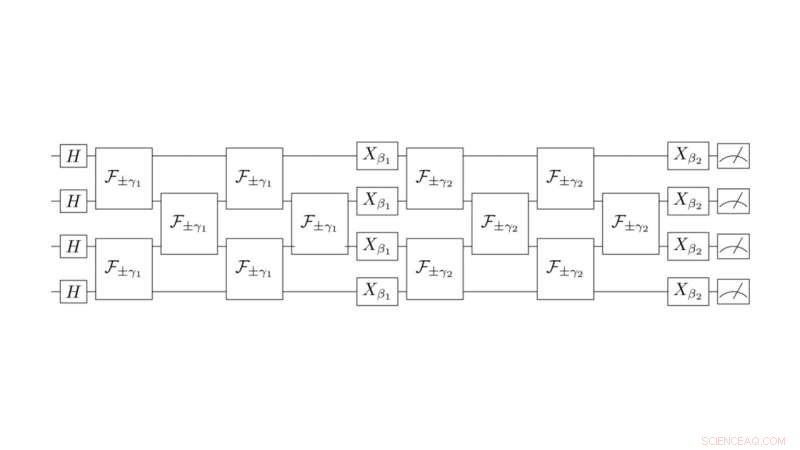
Schema van SWAP-netwerken voor QAOA op vier qubits. Krediet:Akel Hashim/Berkeley Lab
Het onderzoekspartnerschap maakte gebruik van Super.tech's SuperstaQ-software, waardoor wetenschappers hun toepassingen nauwkeurig konden afstemmen en de compilaties van circuits voor de supergeleidende hardware van AQT konden automatiseren, met name voor een native high-fidelity gecontroleerde S-poort, die niet beschikbaar is op de meeste hardwaresystemen. Deze slimme compileerbenadering met vier transmon-qubits zorgt ervoor dat de SWAP-netwerken efficiënter kunnen worden afgebroken dan standaard decompositiemethoden.
A network of ZZ SWAP gates requires only minimal linear connectivity between qubits without additional couplings, so it offers practical advantages for the efficient execution of quantum algorithms such as the Quantum Approximate Optimization Algorithm (QAOA). QAOA approximates solutions to combinatorial optimization problems—finding the optimal answer by giving a set of criteria. The Maximum-Cut problem, which can be used to arrange hubs on a transport grid system, is an example of a famous combinatorial optimization problem that can be potentially solved faster with QAOA using quantum circuits.
"One of the toughest challenges in quantum computing is to perform discrete logic operations. Because our control signals are analog and continuous, they're always imperfect. As we build more complex quantum circuits, the software infrastructure that optimally compiles gates tailored for AQT's hardware helps us achieve higher operational fidelity," Akel Hashim, the lead AQT researcher on the experiment and a graduate student at the University of California, Berkeley.
"A unique feature of quantum computing is that it enables partial logic gates. This feature has no parallel in traditional boolean logic—for example, your laptop computer can't execute 50% of an AND gate. AQT's ability to calibrate these partial controlled-S quantum gates opened the door for us to develop a wider array of novel optimizations to squeeze the most out of the hardware," said Rich Rines, formerly of Super.tech and currently a software engineer at ColdQuanta.
"A key software engineering challenge for this experiment was collaborating remotely, so we iteratively developed quantum circuit optimizations informed by the custom gates AQT's team calibrated. We optimized end-to-end by figuring out how to serialize these pulses while considering the hardware. We also figured out how to integrate open-source quantum software packages with our compiler, ensuring that our optimizations don't re-invent the wheel," said Victory Omole, formerly at Super.tech and software engineer at ColdQuanta.
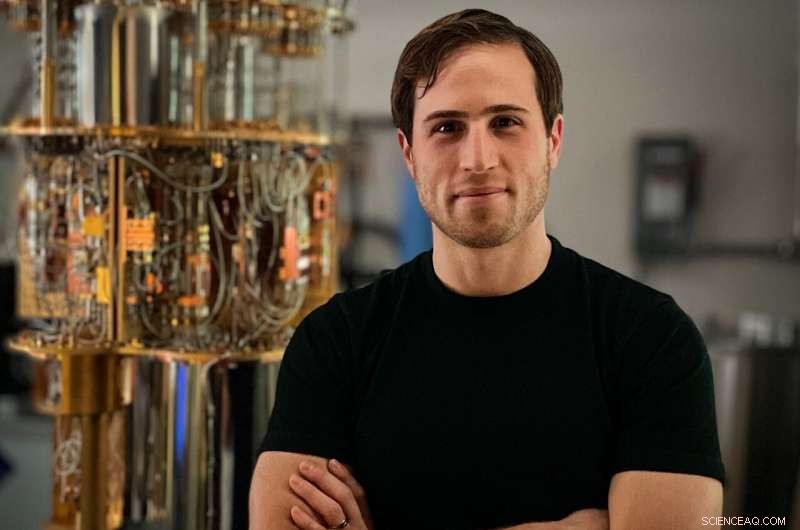
Akel Hashim, lead AQT researcher on the experiment. Credit:Akel Hashim/Berkeley Lab
As part of the experiment, the team also introduced a novel technique called Equivalent Circuit Averaging (ECA), which randomized the various parameters of the SWAP networks to generate many logically equivalent circuits. ECA randomizes the decomposition of quantum circuits, mitigating the impact of systematic coherent errors—one of the most severe errors in quantum computers and error mitigation at AQT.
"I proposed a way to merge my previous experimental work in randomized compiling with Quantum Benchmark (acquired by Keysight) using Super.tech's smart compiler to study a new way to reduce the impact of crosstalk errors," said Hashim. "I would not have had the insight to come up with this idea had I not worked with other researchers as part of AQT's user program. As someone who's going to enter the workforce, networking is critical to building a core base of people I know in the field who are experts in various areas, to whom I can pitch research ideas as well."
These experimental optimizations resulted in an improvement of up to 88% in the performance accuracy of QAOA. Researchers are looking to continue to explore and refine the methods in this work and apply them to other applications.
Supporting industry growth with an open-access research lab
AQT operates a state-of-the-art open experimental testbed based on superconducting circuits and is funded by the United States Department of Energy Office of Science Advanced Scientific Computing Research (ASCR) program. Technologies developed elsewhere can be deployed and field-tested at AQT, providing deep access to the full quantum computing stack at no additional cost.
Since the inauguration of its user program in 2020, AQT provided Super.tech, one of several industry users, with low-level access to the hardware to test their ideas. Few cloud-based quantum platforms offer this type of full access to the entire quantum computing stack and real-time feedback from the hardware experts at no cost. Super.tech collaborated with AQT's expert experimental team to learn ways to improve performance on this type of hardware.
"By revealing the inner controls of quantum hardware, AQT's collaborative approach with users drives innovation throughout the quantum computing stack. We look forward to continuing our research collaboration with AQT, and we will continue to share these results with the scientific community by publishing our learnings," said Pranav Gokhale, VP of Quantum Software at ColdQuanta and Super.tech former CEO and co-founder.
AQT at Berkeley Lab continues to grow as a cutting-edge hub for quantum information research and development by bringing together expertise and users, including early-stage startups, such as Super.tech, who now continue in their growth journey as part of ColdQuanta. + Verder verkennen
Breakthrough in quantum universal gate sets:A high-fidelity iToffoli gate
 Hoe maak je een ecosysteem voor kinderen met pop-flessen
Hoe maak je een ecosysteem voor kinderen met pop-flessen Kleuren die zwarte vliegen aantrekken
Kleuren die zwarte vliegen aantrekken  IJzer opgelost door luchtvervuiling kan het oceaanpotentieel vergroten om koolstof vast te houden
IJzer opgelost door luchtvervuiling kan het oceaanpotentieel vergroten om koolstof vast te houden Hoe de Antarctische Circumpolaire Stroom helpt om Antarctica bevroren te houden
Hoe de Antarctische Circumpolaire Stroom helpt om Antarctica bevroren te houden De stikstofpuzzel oplossen:grondwaterverontreiniging door landbouw meten
De stikstofpuzzel oplossen:grondwaterverontreiniging door landbouw meten
Hoofdlijnen
- Wat is het ultieme eindresultaat van glycolyse?
- Overeenkomsten in de structuur van mitochondria en chloroplasten
- Lijst van eencellige organismen
- Kinesins negeren zwakke krachten omdat ze zware lasten dragen
- Celstructuur van Nostoc
- Stadia van meiose met een beschrijving
- Niveaus van celorganisatie
- Grote katten in Groot-Brittannië - stedelijke mythe of wetenschappelijk feit?
- Klimaatverandering kan het mariene milieu meer dan wat dan ook beïnvloeden
- Hoe golven te buigen om op de juiste plaats te komen?

- De supergeleidende magneten van de toekomst
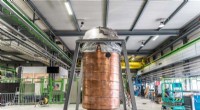
- Volledige experimentele bepaling van de tunneltijd met een attosecond-scale streaking-methode
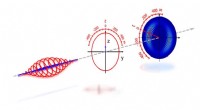
- V.S. en Tsjechische wetenschappers werken samen om de productie van gammastraling te onderzoeken met krachtige lasers

- Hoe komt plastic afval in de oceaanafvalplekken terecht?

 Onderzoek toont aan dat de huidige CO2-niveaus in de atmosfeer hoger zijn dan een record van 23 miljoen jaar
Onderzoek toont aan dat de huidige CO2-niveaus in de atmosfeer hoger zijn dan een record van 23 miljoen jaar Wat is een glijlager?
Wat is een glijlager?  Onderzoekers passen E. coli aan om planten om te zetten in hernieuwbare chemicaliën
Onderzoekers passen E. coli aan om planten om te zetten in hernieuwbare chemicaliën NASA vindt Gabrielles kracht aan de noordkant
NASA vindt Gabrielles kracht aan de noordkant Hoe het volume van een Atom
Hoe het volume van een Atom Gevoelige en selectieve detectie van koolstofnanobuisjes via fotoluminescentie
Gevoelige en selectieve detectie van koolstofnanobuisjes via fotoluminescentie Wat is een coëfficiënt in een chemische formule?
Wat is een coëfficiënt in een chemische formule?  Onderzoekers verkennen open cluster NGC 2506 met AstroSat
Onderzoekers verkennen open cluster NGC 2506 met AstroSat
- Elektronica
- Biologie
- Zonsverduistering
- Wiskunde
- French | Italian | Spanish | Portuguese | Swedish | German | Dutch | Danish | Norway |

-
Wetenschap © https://nl.scienceaq.com

